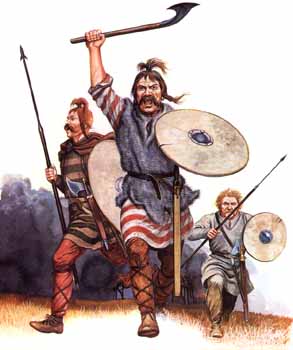The Franks
 The Franks were a group of Germanic peoples inhabiting the lower and middle Rhine Valley by the 3d century AD, when they are first mentioned by classical authors. Identified by these writers as the Salians, Ripuarians, and Chatti, they are said to have shared the same language and to have had many similar laws.
Toward the middle of the 3d century the Franks began penetrating the Roman frontier around Mainz. They were driven back by Emperor Probus. In 358, Julian the Apostate handed over Toxandria, the region between the Meuse and the Scheldt rivers, to the Salian Franks, who became Roman allies and provided troops for the imperial army.
The Franks were a group of Germanic peoples inhabiting the lower and middle Rhine Valley by the 3d century AD, when they are first mentioned by classical authors. Identified by these writers as the Salians, Ripuarians, and Chatti, they are said to have shared the same language and to have had many similar laws.
Toward the middle of the 3d century the Franks began penetrating the Roman frontier around Mainz. They were driven back by Emperor Probus. In 358, Julian the Apostate handed over Toxandria, the region between the Meuse and the Scheldt rivers, to the Salian Franks, who became Roman allies and provided troops for the imperial army.
The Salian Franks were divided into several groups led by chiefs (reguli). One of these groups, the Merovingians, which took its name from the chief Merovech (Merowen), was particularly successful. Merovech and his successor, Childeric (d.481), extended Salian domination to the south, perhaps as far as the Somme River. Childeric aided the Romans, but after the death (461) of Emperor Majorian he sought to overthrow Aegidius, the imperial governor in northern Gaul. Aegidius forced Childeric into exile among the Thuringians, but he returned after a few years and, in alliance with some Saxons, defeated the Romans.
Syagrius, Aegidius's son and successor, was able to keep Childeric from moving his people south of the Somme, but another regulus took control of Le Mans. Cambrai and Therouanne were also held by Salian reguli. CLOVIS, Childeric's son, conquered most of Gaul and unified the Franks under the Merovingian dynasty. Clovis also converted to Christianity.
The Ripuarian Franks and the Chatti raided across the middle Rhine frontier during the first quarter of the 5th century. In the wake of the Hunnic invasion of Gaul, a band of Ripuarians gained control of Cologne. By c.470, Trier was in Ripuarian hands, and thereafter Metz, Toul, and Verdun fell to the Franks. The Carolingian dynasty, which succeeded the Merovingians, is considered to have been of Ripuarian origin.
Under the Carolingians, the Franks formed a vast empire that reached its pinnacle in the reign (768-814) of Charlemagne. This empire was divided in the mid-9th century, from it emerging the West Frankish kingdom (France) and the East Frankish kingdom (Germany).
Much is known about the material civilization of the Franks during the period before they became Christians. Thousands of graves have been discovered in which have been found not only skeletons but various kinds of weapons, jewelry, and even bits of cloth and leather. The most celebrated find was the grave of Childeric, discovered at Tournai in 1653. A great wealth in gold, including a signet ring with his portrait on it, and the severed head of his horse were among its contents.
Return to the Roleplaying Page
 The Franks were a group of Germanic peoples inhabiting the lower and middle Rhine Valley by the 3d century AD, when they are first mentioned by classical authors. Identified by these writers as the Salians, Ripuarians, and Chatti, they are said to have shared the same language and to have had many similar laws.
Toward the middle of the 3d century the Franks began penetrating the Roman frontier around Mainz. They were driven back by Emperor Probus. In 358, Julian the Apostate handed over Toxandria, the region between the Meuse and the Scheldt rivers, to the Salian Franks, who became Roman allies and provided troops for the imperial army.
The Franks were a group of Germanic peoples inhabiting the lower and middle Rhine Valley by the 3d century AD, when they are first mentioned by classical authors. Identified by these writers as the Salians, Ripuarians, and Chatti, they are said to have shared the same language and to have had many similar laws.
Toward the middle of the 3d century the Franks began penetrating the Roman frontier around Mainz. They were driven back by Emperor Probus. In 358, Julian the Apostate handed over Toxandria, the region between the Meuse and the Scheldt rivers, to the Salian Franks, who became Roman allies and provided troops for the imperial army.